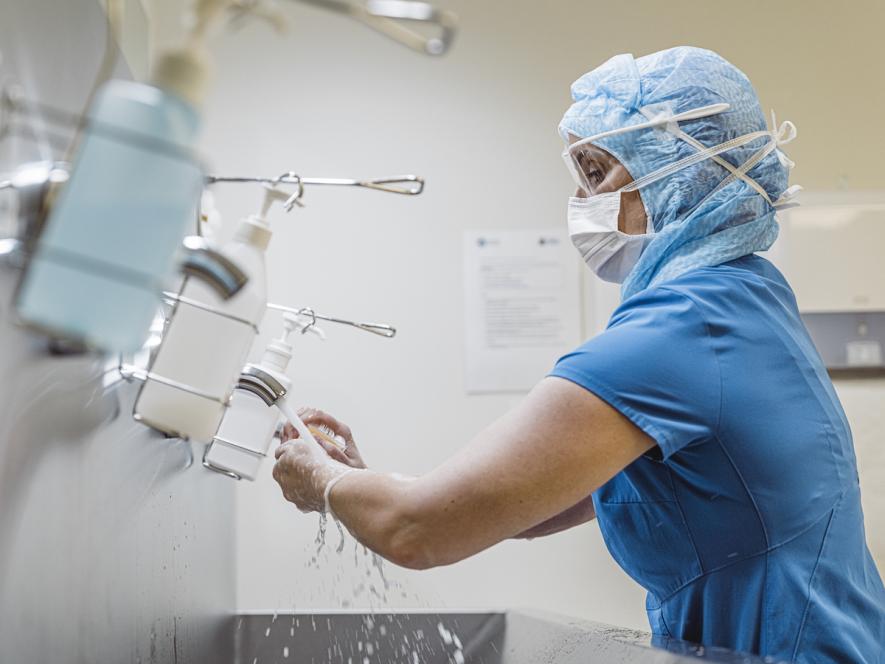
Simply having colorectal cancer at this point is not believed to make someone more prone to being infected by SARS-CoV-2 (the virus that causes COVID-19) or more prone to serious complications.
There are some conditions that are recognised as higher risk factors and these are the ones that affect the respiratory tract and the heart, and any types of cancer that affect these areas (lung cancer for example). Unless the cancer is so advanced that it is severely impairing the immune system, the greatest risk is for patients that are currently undergoing treatment or who have recently completed treatment for colorectal cancer.
Patients undergoing 'active treatment', ie either radiation or chemotherapy to treat cancer, as well as patients who have recently undergone surgery for colorectal cancer, will be immunocompromised. This is due to the destruction of immune system cells, especially white blood cells, making the patient more vulnerable to SARS-CoV-2 infection.
The body's immune system begins to build up to normal strength immediately after treatment stops, however it may take anything up to 9 months (and a minimum of 2 months) for it to be functioning at normal levels. The period when patients are at their most vulnerable is during and immediately after treatment. The actual recovery period will vary from patient to patient, depending on a number of circumstances, however having low lymphocyte counts and/or the use of immunosuppressive agents is strongly associated with immune suppression.
There is currently very little research information out there on the impact of SARS-CoV-2 infection and the progression of COVID-19 on people with cancer. A recent study[1] was published in The Lancet in February and was based on experience in China. In the report the authors simply stated that…
“We found that patients with cancer might have a higher risk of COVID-19 than individuals without cancer. Additionally, we showed that patients with cancer had poorer outcomes from COVID-19, providing a timely reminder to physicians that more intensive attention should be paid to patients with cancer, in case of rapid deterioration.”
The report's conclusions may however not be that helpful, as the sample size was just 18 patients with a range of different cancers and other comorbidities (eg smokers, COPD, high blood pressure) and was a mix of survivors and current patients.
Another study of 1,590 patients with COVID-19[2] again in China (released on 27 February, but not yet peer reviewed) indicated that the 130 patients (8.2%) with at least two comorbidities had 'significantly escalated risks of reaching to the composite endpoint' compared to those with only one comorbidity (269 patients). The composite endpoint/s were admission to ICU, invasive ventilation or death. Once age and smoking status were adjusted for, patients with COPD, diabetes, hypertension and cancer were 'more likely to reach to the composite endpoints than those without.'
If a cancer patient develops symptoms
Where a colorectal cancer patient develops symptoms (high fever, deep dry cough, fatigue, shortness of breath), the advice would be to immediately contact their GP or specialist and let them know if they have respiratory symptoms, or, where the patient feels very ill, go to an Emergency Department and if at all possible let ER know in advance they have respiratory issues.
How to maintain a healthy immune system
There are a number of things cancer patients can do to get their immune system as health as it can be. These are…
- Get plenty of sleep
- Get some exercise, ideally aerobic (walking, light jogging)
- Eat well – limit refined carbohydrates and eat plenty of fresh fruit and veg
- Don't smoke
- To the extent that someone can as a cancer patient during this outbreak, try to limit stress
Whilst having established colorectal cancer can potentially alter how the body handles coronavirus, the converse - ie how the virus might alter your risk of developing cancer - is also worth considering. There will almost certainly be no direct link, but in line with Dr Renaut’s hypothesis, as written in his book (The User's Manual For Your Body), a poorly functioning immune system secondary to insulin resistance is the underlying problem and will increase your risk of both.
See also Dr Renaut's videos on Coronavirus…
The best way to fight Coronavirus - learn how to strengthen your immune system to fight Coronavirus [VIDEO]
We must reconsider current coronavirus strategy [VIDEO]
[1] Cancer patients in SARS-CoV-2 infection: a nationwide analysis in China The Lancet
[2] Comorbidity and its impact on 1,590 patients with COVID-19 in China: A Nationwide Analysis medRxiv